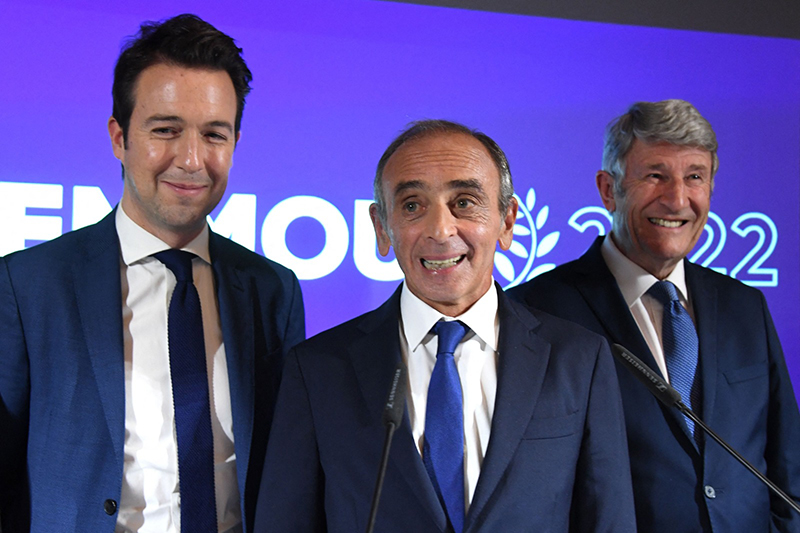PARIS: Having entered France's presidential race full of sound and fury, far-right TV pundit Eric Zemmour risks seeing his campaign amount to nothing because of a widely contested clause of electoral law. Like all candidates in the race, Zemmour needs to muster 500 endorsements from elected figures around the country by the middle of March in order to have his name on the ballot paper for the polls in April.
His dramatic entrance into front-line politics after a career spent in the media sent waves through the French ruling class in September, making him briefly the most talked-about challenger to President Emmanuel Macron. But the anti-Islam populist has admitted he risks being excluded unless more mayors and other elected figures agree to back him under a system he has denounced as discriminating against political outsiders.
"The endorsement system is there to prevent far-fetched candidates from running," Zemmour said on Monday. "It's not there to enable established parties to monopolise the election and block rivals." He said that he had secured only 300-350 pledges so far, but stressed that these are "at the moment only promises", suggesting some of them will not materialise.
Securing 500 signatures from a pool of 42,000 elected French figures that includes mayors, MPs and local councillors sounds an easy task, but other veteran candidates are also reporting difficulties. These include longstanding far-right leader Marine Le Pen, who has an established grassroots party unlike Zemmour, and hard-left leader and MP Jean-Luc Melenchon, who heads the France Unbowed movement.
'Real problem'
A large part of the explanation is that, since a reform under former President Francois Hollande in 2016, endorsements are now made public. This means many mayors are reluctant to back controversial and divisive figures such as Zemmour, who has two hate crime convictions, because they fear pushback from their local communities.
Others fret about backing someone from outside their party, which might cause them problems with their own political family-something they could avoid under the previously anonymised system. Stephane Zumsteeg, a political analyst at the Ipsos polling firm, said that "creating suspense" about the endorsement system was an "old classic" in French politics, used repeatedly by Le Pen and her father Jean-Marie in the past.
"It keeps them in the public eye and enables them to present themselves as victims of the system," he told AFP. "That said, in the particular case of Eric Zemmour, there's a real problem, unless he is given help," he added. "Fewer and fewer mayors are agreeing to endorse candidates." Interior Minister Gerald Darmanin ruled out any change to the law on Tuesday, saying "you don't change the rules a few days before the match."
Helping hand?
Le Pen, who has most to lose from a Zemmour candidacy, has said in private that she believes her 63-year-old rival will not go the full distance and compete in the two-round election which begins on April 10. Beyond the short-term challenge of gathering endorsements, surveys of voters currently put the best-selling author and commentator behind Macron, Le Pen and right-winger Valerie Pecresse in fourth, with about 13 percent.
He is also trending downwards, polls show, having been pictured giving the middle-finger to a protester in December and seeing his first major political rally overshadowed by a brawl involving a far-right gang. His lack of momentum has made it difficult to lure big-name talent to his team, although the defection of the former number two in the mainstream right-wing Republicans party, Guillaume Peltier, represented a small victory at the weekend.
If he were to pull out, analysts wonder who would benefit most on the right: Pecresse from the Republicans, who is running a campaign focused on law and order, or Le Pen? "It's difficult to say categorically," said Zumsteeg. "Roughly, you could imagine it splitting with two-thirds of votes going to Le Pen and a third to Pecresse."
As a result, many observers suspect Pecresse's deep-rooted Republicans party might lend a helping hand to Zemmour behind the scenes to keep him in the race in order to draw votes away from Le Pen. Macron remains the favourite overall, polls show. Zemmour sounded resolute and confident on Monday as he addressed a New Year's press conference-which consisted of a diatribe against the "politically correct" media which he said the public was "right to be angry at." "In exactly a year, I will invite you to the presidential palace and our relationship will not be the same," he said. - AFP


